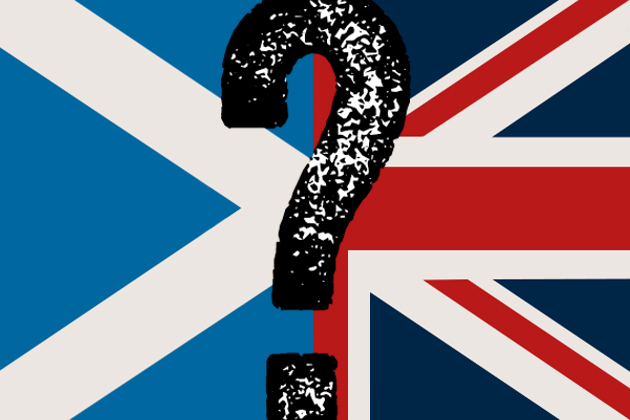On Sept. 18, the people of Scotland will vote whether to end its 307-year union as part of the United Kingdom and become an independent nation. Christopher Clark, head of the History Department in the College of Liberal Arts and Sciences, who grew up in England, moderated a roundtable discussion at the Humanities Institute earlier this week titled: “An Independent Scotland: The Breakup of the U.K.?” He spoke with UConn Today about the issue.
Why is there a vote for Scottish independence now?
The answers to this lie in changes that have occurred over the past 50 years or so. For long, most Scots identified equally as Scottish and British. Scots had been heavily involved with the forming and running of the British Empire, in the British industrial economy, in the British armed forces, and so forth. But the Empire has gone, industry has declined, and the military is much reduced in size, so the strong identification of “Scottishness” with “Britishness” has weakened. Structural and economic changes and disagreements – for example over whether the benefits from the exploitation of North Sea oil since the 1960s have been fairly apportioned – have heightened discontentment with being part of the U.K.
Politics has reflected this. Since 1707, Scots have elected members to sit in Parliament in London. For much of the 20th century they voted for political parties that were Unionist. From the 1920s to the 1960s, the Conservative Party (known as the Unionist Party in Scotland) predominated: in 1955 it obtained an absolute majority of Scottish seats. But Scottish Conservatism largely collapsed in the 1980s and 1990s, as the party’s national policies became increasingly unpopular in Scotland. The 1997 election saw no Conservatives elected from Scotland, and since 2001 there has only been one Conservative-held Scottish seat in the U.K. Parliament.
A referendum in Scotland in 1997 led to the re-establishment of a Scottish Parliament, with some powers “devolved” from London. In 2007, the Scottish National Party, whose policy is to pursue independence from the U.K., formed a minority government in Scotland. In 2011, it was returned with a firm majority and a mandate to seek the independence referendum that’s being held this week. The effects of the economic recession and the divergence of Scottish aspirations from the austerity policies of the Conservative-led coalition government in London have increased many Scots’ disillusionment with the U.K. and to the feeling that independence would better enable them to pursue their own interests.
Recent polls have indicated an almost even split between independence and remaining part of the United Kingdom. How much of this is a reflection of the change in voting eligibility that will allow 16- and 17-year olds to cast a ballot, following the most recent census showing that a majority of the population is 65 and over?
This is not a general election for political parties. It’s a vote on a straight up or down question. We don’t know how the 16- and 17-year-olds will vote. The Scottish National Party wanted them in the referendum because they thought younger people would be more likely to vote for independence. We’ll see shortly whether they were right about that.
What are the major economic issues that a vote for independence will bring about?
Currency is the single biggest one. The Scottish government has said an independent Scotland would continue to use the pound sterling. The U.K. government has said that it won’t enter a currency union with an independent Scotland. Alternatives are not particularly palatable: there are great risks and costs involved in establishing a new currency, while the ongoing crisis in the Euro currency zone has meant that the Scottish government has not proposed to join the Euro. Using sterling without a currency union would seem likely to undermine independence itself, since there would be no Scottish control over it. That is why Scottish banks and other financial institutions announced they would move their headquarters to England in the event of independence, because there will be no Scottish central bank, and they’ll want the protection of the Bank of England.
Would Scotland join the European Union?
It has always been the Scottish intention to be part of the European Union as an independent country. At first it was assumed that membership would be automatic, but there now seems to be acceptance that EU law would require Scotland to seek membership. No EU member has previously divided, so it is unclear whether Scotland would be able to join through a revision of the existing arrangements between the EU and the U.K., or whether it would have to apply afresh like any other country seeking EU membership. There is speculation that Spain or another country fearful of independence movements in its own territory (in Spain’s case, Catalonia and the Basque country) would vote against Scotland’s entry.
On the other side of the equation, were a Conservative government to be elected in the U.K. in 2015, it would promise a referendum on EU membership in 2017, raising the risk that the U.K. could withdraw from the EU. Support for EU membership is stronger in Scotland than in England, so that possibility has become an argument for voting for Scottish independence.
There is this extraordinary prospect that after Thursday’s vote the United Kingdom could break up. The Scottish government said it would remain a monarchy, as in the case of Canada and some other former parts of the British Empire. Scotland would also presumably work towards producing a written constitution, which the U.K. doesn’t have.




